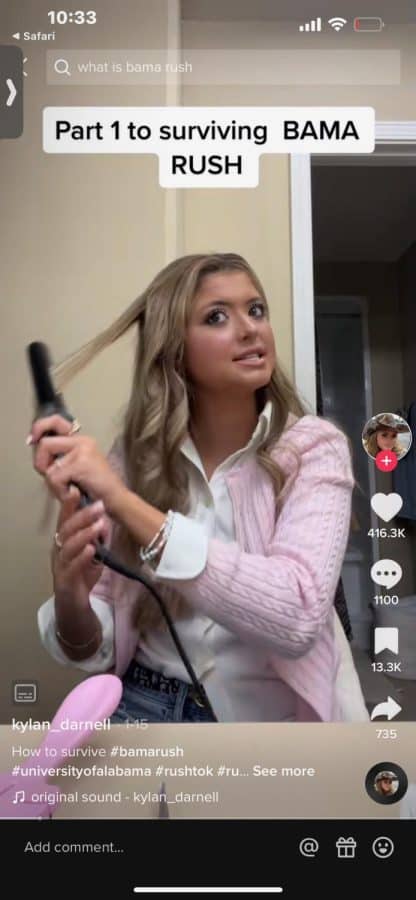UA community and student influencer discuss possibility of campus TikTok ban
February 3, 2023
University of Alabama faculty and students are expressing concerns about a potential ban of the social media app TikTok, which has recently been banned by Auburn University.
Auburn’s ban comes after Alabama Governor Kay Ivey announced a ban of TikTok on state devices and networks to prevent data leaks in December 2022, following national conversations about the security of Americans’ data on the app, which is owned by Chinese company ByteDance, and concerns the Chinese government could order the company to turn over American users’ data. TikTok has maintained that such fears are unfounded.
Some schools, including Auburn University, the University of Texas at Austin, and the University of Arkansas have followed suit and banned the social media app from campus networks following state bans in their states. Auburn University officially banned the app from its Wi-Fi network on Dec. 13, 2022. The University of Texas at Austin followed suit on January 18, 2023, and Arkansas did so on Jan. 25, 2023.
Jessica Maddox, an assistant professor of digital media at the University, said Ivey’s ban on state IT infrastructure or devices issued to government employees could pose a problem if the University doesn’t want to ban the app.
“One of the things people often forget about is that as public universities we are technically government entities,” Maddox said. “Our colleagues and friends over at Auburn, they have interpreted Governor Ivey’s order as such. A state IT infrastructure runs their university, therefore TikTok should be banned at their university.”
“TikTok is how I inspire people.”
Kylan Darnell, a freshman majoring in news media, is a TikTok influencer who rose to stardom through Bama Rush Tok. Bama Rush Tok showcased the recruitment process for girls pledging to join sororities before the fall semester. #BamaRush was used by potential new members to show off their outfits of the day, rush events, and a way for active members to highlight their side of the rush process.
As a result of Bama Rush Tok, Darnell’s followers increased from 175,000 followers to over 635,000. Before Darnell took the TikTok world over with Bama Rush Tok, she used her TikTok platform to showcase the pageant world as former Miss Ohio Teen USA.
Darnell said she had no idea what Bama rush was until she came to the University. She said she began posting about Bama rush on TikTok to explain what it was for her followers.
Darnell said she creates content that showcases her sorority, outfit of the day, beauty and positive affirmations.
“[I’m] just trying to inspire people to have a great day, not just a good day,” Darnell said.
In addition to using her role as an influencer to try to shed light on the positive side of college, Darnell said she uses TikTok and branding deals as her main source of income, which pays for her out-of-state tuition and will allow her to graduate debt-free.
“It has definitely changed my life and I am going to graduate debt-free,” Darnell said.
Darnell said a potential ban of the app would take away an outlet of communication for students and be a potential violation of free speech.
“It’s how I connect with people. TikTok is how I put myself out there. TikTok is how I express my emotions. TikTok is how I inspire people,” Darnell said.
Even if the app was banned, students would still use TikTok through their cellular data if it was banned on the campus network, something Darnell said she would also. She added that despite that, she would still respect the University’s rules and a potential ban.
Perhaps more importantly, Darnell said the future of Bama Rush Tok would be dependent on what rules the University sets in place if a ban occurs. Darnell said she believes girls are becoming more educated about sorority life through TikTok. Social media has become a lucrative recruiting tool for sororities, boosting recruitment participation, which is something universities can use to their advantage.
“What is the app actually collecting?”
Travis Atkison, an associate professor of computer science, said the concerns about ByteDance giving the Chinese government user data aren’t unfounded, and that there are a lot of security concerns surrounding TikTok due to the way the company handles privacy of data.
“The Chinese government can and does go to their companies and say give us their data, and the companies have to do that,” Atkison said.
Atkison said that unlike the United States, other countries, like China, don’t have any laws in place to protect the sharing of data. He said many people are questioning what the app can track and where this information goes.
“What is the app actually collecting? There have been stories about the app being able to access all your contacts and from that try to find out who from your contacts are also on TikTok. It’s also looked at browsers’ histories and what are you looking at,” Atkison said.
“As a society we have to be much more careful about how we release our private data, something called PII, Personally Identified Information,” Atkison said.
Atkison said if a ban was enacted, the University could either block access to the app while consumers use campus Wi-Fi or ban the app from being used on any UA-controlled device. This would include any computer or device on the University’s network, including those at libraries and computer labs.
Maddox also said the University could enact a similar network ban to what other colleges have done.
“We might see something similar to what happened at the University of Texas at Austin in which there was a network ban, meaning the app would no longer be able to load on campus Wi-Fi,” Maddox said.
Maddox said a potential ban could impact UA students’ careers and income as they use TikTok as influencers or for networking purposes, which could challenge free speech.
Haley Scott, a junior majoring in public relations, said she uses TikTok for enjoyment but has also thought about using it for her future career.
“I can learn a lot of stuff on there as well,” Scott said.
Scott said she thinks TikTok is educational and brings topics to light that many people don’t know about.
If the University of Alabama were to enact a network ban of the app, Scott said, “They [students] would feel like they weren’t in control of what they could do.”
Scott said she thinks a potential ban would make students feel like they weren’t in control of their freedoms.
“I think a lot of students would kind of be outraged,” Scott said.
The University of Alabama did not respond to multiple requests for comment.




















